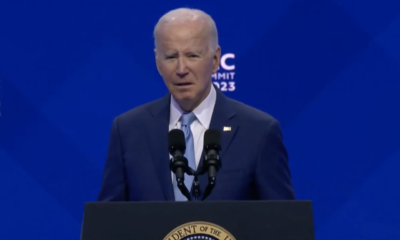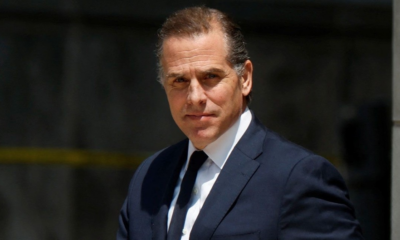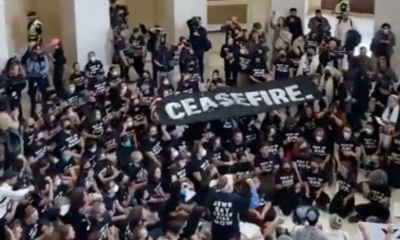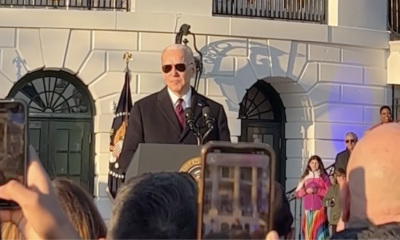
Courtesy of senschumer/Instagram
U.S. senators will convene on Wednesday for the inaugural AI Insight Forum, during which tech leaders will address questions on artificial intelligence and how it should be harnessed and regulated for the benefit of the American people.
“A gathering unlike any seen before, to debate a topic unlike any other,” Sen. Chuck Schumer (D-N.Y.) said in remarks on the Senate floor last week announcing the event, which will be the first in a series of forums.
“Our AI Insight Forums will convene some of America’s leading voices in AI, from different walks of life and many different viewpoints. Executives and civil rights leaders. Researchers, advocates, voices from labor and defense and business and the arts. I am proud to say next week’s AI Insight Forum – the first of a whole series we will host this fall – will be high-powered, diverse, but above all, balanced,” Schumer said.
He stressed the bipartisan nature of the event, thanking fellow organizers Sens. Mike Rounds (R-S.D.), Todd Young (R-Ind.), and Martin Heinrich (D-N.M.).
Invited panelists include Elon Musk of Tesla, SpaceX and social media platform X, formerly Twitter. Musk has previously warned that AI poses an existential threat to humanity. Earlier this year, he and dozens of other tech leaders signed onto a letter that said “mitigating the risk of extinction from AI should be a global priority.”
Other invitees reportedly include Bill Gates, Mark Zuckerberg, and Sam Altman, the CEO of ChatGPT maker OpenAI.
Human extinction is hyperbolic, given that technology has largely moved society forward historically, paving the way for greater wealth creation and improvements in living and working conditions,” said Bradley Schurman, founder and CEO of the demographic strategy firm, The Super Age, which helps public and private-sector organizations navigate disruptive population change.
“However, every technological leap comes with risks, including making certain jobs redundant. The big question is the speed of the AI transformation and whether or not society can keep up,” Schurman said.
Part of the conversation should be focused on the data than underpin artificial intelligence systems.
“There is no AI without data,” said AI adviser and tech executive Marva Bailer, author of “Be Unexpected: Resetting Routines to Revolutionize the Future of Work.”
“This week’s AI conversation is a data conversation. Ninety percent of the world’s data, 120+ zettabytes, were created in the last two years,” Bailer said, adding that pace of data creation is expected to increase exponentially in the coming years.
“What has changed is the scale, security, and infinite uses of this data. AI accelerates these models with the support of new computing power and supporting technologies,” Bailer said.
“Continued conversation on transparency, innovation, economics, and value all with a lens of human experience and contribution is both an opportunity and a challenge,” Bailer said.
“AI’s impact is uniquely broad and deep, touching almost everything we do in ways we can’t yet understand. It’s reassuring to see governments taking this seriously,” said Peter Swain, CEO of A3 Finance.
“Ensuring our systems of government, welfare and economy evolve in line with our technology is key if AI is to become a force for good,” Swain said.
“I welcome the Senate’s approach to these brainstorming sessions, but question those invited to attend. I’m not convinced that more Big Tech input is needed when looking to regulate Big Tech,” Swain said.
“Tech billionaires already have an outsized influence; giving them the mic on AI regulation is counterintuitive to building a balanced, competitive ecosystem that safeguards the public,” said AI business strategist Lisa Palmer.
“Regulations and laws should be shaped by a diverse group of AI thought leaders — including the direct competitors of big tech — not just a few power players who have repeatedly proven that they will prioritize their own interests over broader innovation and fairness. A fair and open field for AI isn’t just the right thing to do, it’s essential for keeping the marketplace competitive and offering more and safer choices to consumers,” Palmer said.
“Closed-door meetings are fundamentally at odds with the ideals of democracy and free-market competition. This secretive approach is more than just a misstep; it’s a grievous error that risks codifying big tech’s stranglehold on the future of AI, at the expense of innovation and public safety,” Palmer said.
She described the “irony” that the federal National Artificial Intelligence Initiative Act calls for an innovation-first approach, but that a lack of federal action has been fine for big players but bad for startups.
“The absence of federal leadership has led states to take matters into their own hands, proposing a maze of over 230 data and AI laws in the last 4 years,” Palmer said. “It’s a situation that big tech can afford to navigate, but startups struggle to maneuver.”
Ahead of the forum on Wednesday, two Senate subcommittees are holding Tuesday hearings focused on AI.
The Commerce, Science, and Transportation Committee’s Subcommittee on Consumer Protection, Product Safety and Data Security is holding a hearing titled The Need for Transparency in Artificial Intelligence.
The Judiciary Committee’s Subcommittee on Privacy, Technology, and the Law, meanwhile, is holding a hearing titled Oversight of A.I.: Legislating on Artificial Intelligence. Scheduled witnesses include Brad Smith, president and vice chair of Microsoft and William Dally, chief scientist and senior VP of research at NVIDIA.
TMX contributed to this article.

























